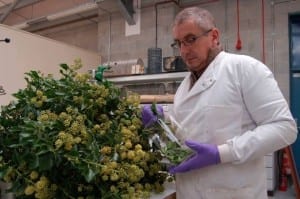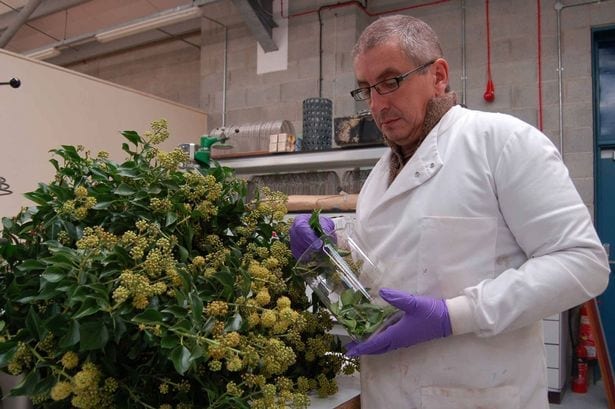
Work to unlock potential of plant life
The many uses of abundant but overlooked plants – from killing slugs to treating athlete’s foot – are being investigated by scientists at Bangor University.
Research into plant-based alternatives to products and ingredients currently derived from crude oil has found that ivy is just one of a range of plants with plenty of untapped potential.
Ivy, which grows abundantly in Wales, is being investigated by Bangor University’s BioComposites Centre at an Anglesey biorefinery for the fine chemicals and other valuable extracts and fibres which it contains.
The focus of the centre’s work is on finding new uses for valuable natural resources which are currently either completely ignored or thrown away.
Scientists have found that ivy could provide a number of extracts which could be used in areas ranging from personal products such as shampoo to horticulture and the food industry.
Development chemist Dr Dave Preskett said: “We’re not making the most of ivy; the plant has great potential.
“We’ve used ivy extract as a slug killer in place of slug pellets. Trials using it as a fungicide to treat potato blight – in place of oil-derived chemical sprays – proved very effective in protecting crops. The same extract also has great potential to be developed in products for treating dandruff and athlete’s foot. An oil produced from the berries is edible as, contrary to popular belief, ivy is not poisonous and has all the health-giving properties of olive oil but the more solid consistency of butter or lard.”
The centre provides the basic investigation into the compounds found in different plants and how they can be used, and also conducts specific contracted work for individual companies.
The new source of materials could also provide vital rural employment opportunities through local processing facilities known as biorefineries.
Go deeper with Bing News on:
Plant-based alternatives
- AI Molecular Farming Making Plant-Based Dairy Easier And Cheaper
Finally Foods unites big data, AI and molecular farming to enhance production and provide sustainable alternatives to animal-based proteins.
- Calls for plant-based alternatives to be labelled with warning signs
Plant-based alternatives to meat, cheese, eggs and yoghurt should be labelled and categorised more clearly to ensure people are aware of products that are ultra-processed, a study has suggested.
- 9 Plant-Based Mayo Brands, Ranked Worst To Best
Some non-vegans prefer it to regular mayo (myself included), while some fans of the traditional spread scoff at the eggless alternative's zestier taste and runnier texture. Before the existence of ...
- Edonia Raises €2M to Redefine Plant-Based Alternatives with Umami-Powered Ingredients from Microalgae
Edonia, a French startup unlocking the potential of microalgae to create protein ingredients for plant-based foods, has raised €2 million in a pre-seed ...
- Czech Retailers Pledge to Make Plant-Based Alternatives More Accessible
At the New Food Forum conference held in Prague on April 18, retailers such as Tesco Czech Republic announced plans to make more plant-based alternatives ...
Go deeper with Google Headlines on:
Plant-based alternatives
[google_news title=”” keyword=”Plant-based alternatives” num_posts=”5″ blurb_length=”0″ show_thumb=”left”]
Go deeper with Bing News on:
Biorefineries
- L.D. 1349: Waterways of Wabanaki significance
An Act to Review State Lands and Waterways That Have Sacred, Traditional or Other Significance to the Wabanaki People.
- UW-Madison scientists develop green method for producing painkillers from poplar trees
Researchers at the University of Wisconsin-Madison Energy Institute made a groundbreaking discovery to produce Tylenol through a more sustainable process.
- Biorefinery Market Soars To USD 296.31 Billion By 2031 With A CAGR Of 8.61% – Comprehensive Analysis And Growth Insights From 2024-2031
SNS Insider has projected a CAGR of 8.61%, the biorefinery market size is anticipated to reach over $296.31 billion by the year 2031.
- Illinois research, resources provide ability for sustainable aviation fuel production
LISLE, Ill. — Illinois has the resources to play an important role in the development of sustainable aviation fuel. “Illinois is the No. 3 in ethanol production at 1.87 billion gallons,” said Vijay ...
- Piper Sandler Keeps Their Sell Rating on Aemetis (AMTX)
In a report released today, Ryan Todd from Piper Sandler maintained a Sell rating on Aemetis (AMTX – Research Report), with a price ...
Go deeper with Google Headlines on:
Biorefineries
[google_news title=”” keyword=”biorefineries” num_posts=”5″ blurb_length=”0″ show_thumb=”left”]











